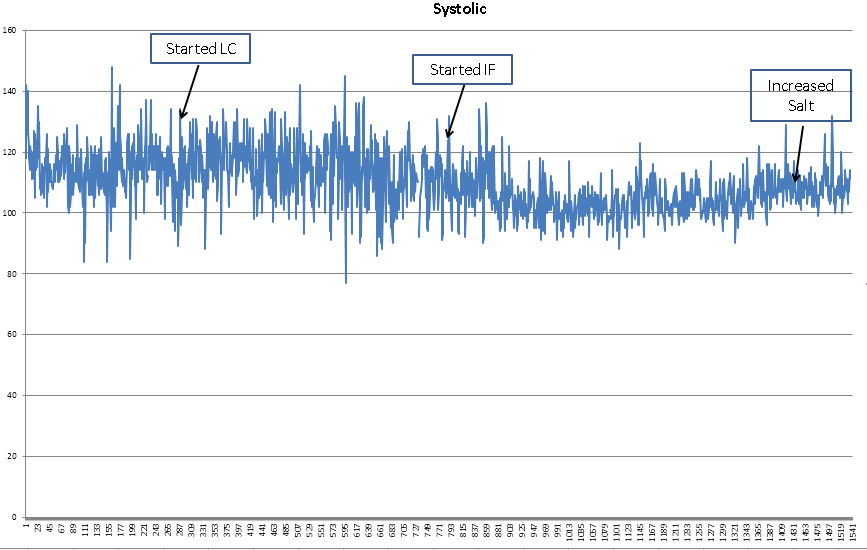Also, there are some indications that as fasting supports mitochondrial “recycling” and repair, it is beneficial for longevity and aging well.
Extended Fasting safe? Fung vs Phinney
I stalled when eating 5+ meals a day on low carb. Insulin is important. And eating that many times a day means that while insulin is better, it’s still not where it could be. Intermittent and especially long term fasting helps.
Here’s an illustration. You can see that IF (which for me started as IF then went to long term fasting) helped more than did low carb. By the time I started IF, I had lost 30 pounds. IF+ long term fasting helped me reduce my blood pressure (NOTE: I lost another 20+ pounds with fasting, so it’s hard to disentangle what’s going on). This is 5.5 years of systolic blood pressure data.
Yes that blood presure drop was quite significant wasn’t it. I think IF is a given on Keto diet. Cravings just go if you eat to satiety. So you were on Keto during the IF period where your BP went down? Isn’t 120 over 80 a good blood pressure. Yours seemed to go well below that. Is that good?
I’m not sure whether blood pressure is good or bad, even so-called “high” blood pressure:
That’s just what happened to me.
I was low carb/keto for the time after I indicated I started “LC”, which means low carb. There were some times when I went to paleo, and one 5-6 month stint where I tried resistant starch, including heated and cooled rice or potatoes. But primarily, this is keto with some occasional forays above keto levels of carbs.
Oh yeah, I meant to say that when I was fating 4.5-5.5 days of fasting, I would get too low of blood pressure, which is what caused me to end my fast one time. I have less of that now, though, for whatever reason. Maybe because I’ve increased my salt intake? (At the beginning, I thought salt was bad.)
It does very little for that.
I think fasting is great, and exercise is great, but exercise isn’t a requirement for fasting in any way.
I beg to differ. Exercise is hugely beneficial during intermittent fasting. Name me one source that says you shouldn’t?
Why would I do that? I’ve never said it, nor anything remotely close to it.
Lets go down this little rabbit hole shall we.
You stated that ‘It does very little for that’. I responded directly to that which you posted.
So based on that sentence you wrote, that could only mean one of two things. You claim ‘It does very little for that’ being exercise isn’t highly beneficial during fasting to lose even more weight or it doesn’t maximise the affect of the body burning it’s own fat. Either way… you are incorrect sir.
Rabbit hole? That’s not what that means in any way.
You wrote the following:
My understanding is there are two things which are critical to successful fasting. Your diet and exercise
Which is where this started, me questioning that exercise was “critical to successful fasting.” And I still do in the face of no evidence to the contrary, and plenty to the support it.
It does very little for that.
I think fasting is great, and exercise is great, but exercise isn’t a requirement for fasting in any way.
You seem to think that exercising burns a lot of calories. Most people who discuss this say it burns very little in contrast to diet changes. I’m going with them. (i.e. Jason Fung’s book “The Obesity Code” and Ch4, “The exercise myth.”)
And even if it did, that would not mean it was “critical to successful fasting” in anyway.
I somehow remember that Phinney was fine with fasting provided it was no longer than three days.
One of the issues I still don’t understand with Phinney’s video you posted is at the 7min mark. He’s referencing the ‘Biggest Loser’ study and showing reduction in BMR, which is fine. But, he’s using it to support his 1st of 5 points on fasting effects. The problem I have is… the Biggest Loser contestants were NOT fasting.
So, he’s either (1) making a point I don’t yet understand, or (2) he didn’t understand the study, or (3) using a caloric restriction study to support his thoughts on fasting [the most likely, I think].
Yes, I think it’s (3), where he’s trying to use it to show how slowly BMR recovers (if it ever does), but I’m not sure it works, given severe caloric restriction ISN’T fasting, and that’s a significant point.
Back to my first question - the discrepancy between the approach of Fung and Phinney - there is an excellent discussion on this, mainly from @richard on the ketodudes podcast ‘protein controversy’ in Sept 2016. (I’ve only just heard that one!) He modestly ‘hypothesises’, but it all makes sense. Overall (if I understand correctly), the it seems likely the body behaves differently depending on whether it has plentiful fat stores ready to burn. For lean people with little fat, protein could get depleted.
I do hope that when Richard has finished his studies, he turns his skills to writing a Keto show me the science textbook for us!


 Note to self: don’t move the goal posts & expect the sports journo not to notice
Note to self: don’t move the goal posts & expect the sports journo not to notice